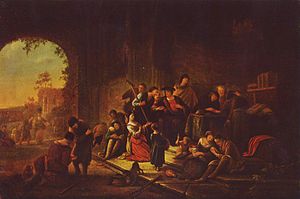Parable of the Workers in the Vineyard
This article uncritically uses texts from within a religion or faith system without referring to secondary sources that critically analyze them. (September 2017) |

The Parable of the Workers in the Vineyard (also called the "Parable of the Laborers in the Vineyard" or the "Parable of the Generous Employer") is a parable of Jesus which appears in the Chapter 20 of the Gospel of Matthew in the New Testament.
Text[]
"For the kingdom of heaven is like a landowner who went out early in the morning to hire workers for his vineyard. He agreed to pay them a denarius for the day and sent them into his vineyard.
"About nine in the morning he went out and saw others standing in the marketplace doing nothing. He told them, 'You also go and work in my vineyard, and I will pay you whatever is right.' So they went. "He went out again about noon and about three in the afternoon and did the same thing. And about the eleventh hour he went out, and found still others standing idle, He asked them, 'Why have you been standing here all day long doing nothing?' "'Because no one has hired us,' they answered. "He said to them, 'You also go and work in my vineyard.' "When evening came, the owner of the vineyard said to his foreman, 'Call the workers and pay them their wages, beginning with the last ones hired and going on to the first.' "The workers who were hired about five in the afternoon came and each received a denarius. So when those came who were hired first, they expected to receive more. But each one of them also received a denarius. When they received it, they began to grumble against the landowner. 'These who were hired last worked only one hour,' they said, 'and you have made them equal to us who have borne the burden of the work and the heat of the day.' "But he answered one of them, 'I am not being unfair to you, friend. Didn't you agree to work for a denarius? Take your pay and go. I want to give the one who was hired last the same as I gave you. Don't I have the right to do what I want with my own money? Or are you envious because I am generous?'
"So the last will be first, and the first will be last."...
— Matthew 20:1–16, New International Version
Interpretations[]

The parable has often been interpreted to mean that even those who are converted to Christianity late in life earn equal rewards along with those converted early, and that people who convert early in life need not feel jealous of those later converts. An alternative interpretation identifies the early laborers as Jews, some of whom resent the late-comers (Gentiles) being welcomed as equals in God's Kingdom. Both of these interpretations are discussed in Matthew Henry's 1706 Commentary on the Bible.[1]
A further interpretation of the parable is that all Christians can be identified with the eleventh-hour workers. Arland J. Hultgren writes: "While interpreting and applying this parable, the question inevitably arises: Who are the eleventh-hour workers in our day? We might want to name them, such as deathbed converts or persons who are typically despised by those who are longtime veterans and more fervent in their religious commitment. But it is best not to narrow the field too quickly. At a deeper level, we are all the eleventh-hour workers; to change the metaphor, we are all honored guests of God in the kingdom. It is not really necessary to decide who the eleventh-hour workers are. The point of the parable—both at the level of Jesus and the level of Matthew's Gospel—is that God saves by grace, not by our worthiness. That applies to all of us."[2]
Some commentators have used the parable to justify the principle of a "living wage",[3] though generally concede that this is not the main point of the parable.[3] An example is John Ruskin in the 19th century, who quoted the parable in the title of his book Unto This Last. Ruskin did not discuss the religious meaning of the parable, but rather its social and economic implications.
See also[]
References[]
- ^ Complete Commentary on the Whole Bible, Matthew Henry, (1706).
- ^ Arland J. Hultgren, The Parables of Jesus: A Commentary, Eerdmans, 2002, ISBN 0-8028-6077-X, p. 43.
- ^ Jump up to: a b William Sloane Coffin, The collected sermons of William Sloane Coffin: the Riverside years, Volume 1, Westminster John Knox Press, 2008, ISBN 0-664-23244-2, p. 109.
| Wikimedia Commons has media related to Workers in the Vineyard. |
- Parables of Jesus
- Gospel of Matthew
- Consequentialism